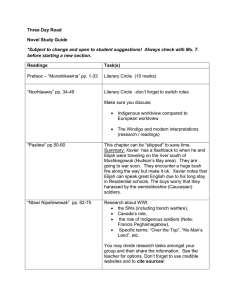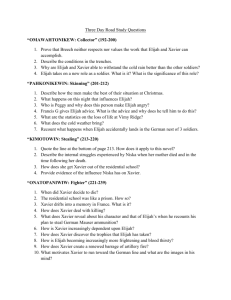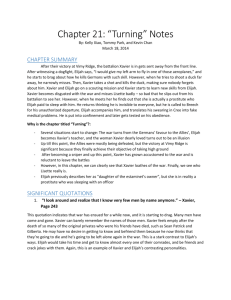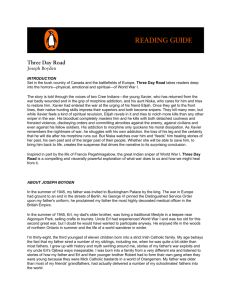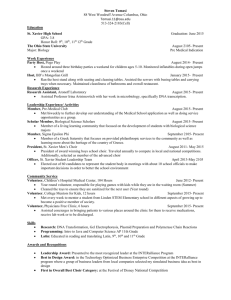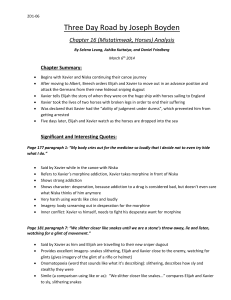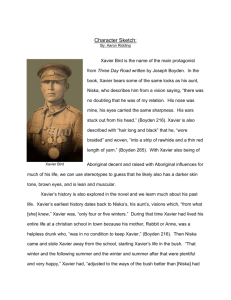Three Day Road – Redemption Essay
advertisement
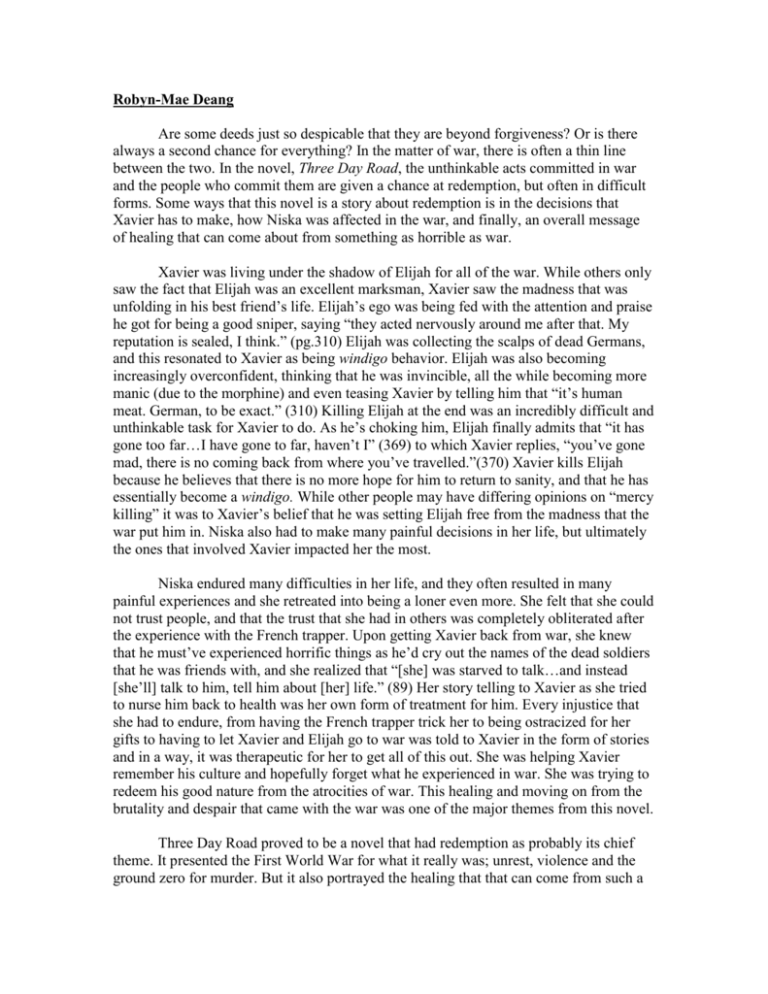
Robyn-Mae Deang Are some deeds just so despicable that they are beyond forgiveness? Or is there always a second chance for everything? In the matter of war, there is often a thin line between the two. In the novel, Three Day Road, the unthinkable acts committed in war and the people who commit them are given a chance at redemption, but often in difficult forms. Some ways that this novel is a story about redemption is in the decisions that Xavier has to make, how Niska was affected in the war, and finally, an overall message of healing that can come about from something as horrible as war. Xavier was living under the shadow of Elijah for all of the war. While others only saw the fact that Elijah was an excellent marksman, Xavier saw the madness that was unfolding in his best friend’s life. Elijah’s ego was being fed with the attention and praise he got for being a good sniper, saying “they acted nervously around me after that. My reputation is sealed, I think.” (pg.310) Elijah was collecting the scalps of dead Germans, and this resonated to Xavier as being windigo behavior. Elijah was also becoming increasingly overconfident, thinking that he was invincible, all the while becoming more manic (due to the morphine) and even teasing Xavier by telling him that “it’s human meat. German, to be exact.” (310) Killing Elijah at the end was an incredibly difficult and unthinkable task for Xavier to do. As he’s choking him, Elijah finally admits that “it has gone too far…I have gone to far, haven’t I” (369) to which Xavier replies, “you’ve gone mad, there is no coming back from where you’ve travelled.”(370) Xavier kills Elijah because he believes that there is no more hope for him to return to sanity, and that he has essentially become a windigo. While other people may have differing opinions on “mercy killing” it was to Xavier’s belief that he was setting Elijah free from the madness that the war put him in. Niska also had to make many painful decisions in her life, but ultimately the ones that involved Xavier impacted her the most. Niska endured many difficulties in her life, and they often resulted in many painful experiences and she retreated into being a loner even more. She felt that she could not trust people, and that the trust that she had in others was completely obliterated after the experience with the French trapper. Upon getting Xavier back from war, she knew that he must’ve experienced horrific things as he’d cry out the names of the dead soldiers that he was friends with, and she realized that “[she] was starved to talk…and instead [she’ll] talk to him, tell him about [her] life.” (89) Her story telling to Xavier as she tried to nurse him back to health was her own form of treatment for him. Every injustice that she had to endure, from having the French trapper trick her to being ostracized for her gifts to having to let Xavier and Elijah go to war was told to Xavier in the form of stories and in a way, it was therapeutic for her to get all of this out. She was helping Xavier remember his culture and hopefully forget what he experienced in war. She was trying to redeem his good nature from the atrocities of war. This healing and moving on from the brutality and despair that came with the war was one of the major themes from this novel. Three Day Road proved to be a novel that had redemption as probably its chief theme. It presented the First World War for what it really was; unrest, violence and the ground zero for murder. But it also portrayed the healing that that can come from such a terrible experience, and that forgiveness and second chances can be achieved from something like war, even if it is in an unorthodox form. In accordance with their beliefs, Xavier killed Elijah in order to free his spirit from the insanity and blood thirst that the war gave him. He was redeeming Elijah’s ahcahk as he believed that he was sending him on the three day road, away from the plague of violence that the world was facing at that moment. War is too often seen as being a place where you can exercise your valour, bravery and courage for your country. Three Day Road took away this glorification, and in doing this, it brought about redemption for those who lost their lives fighting in this war. The focus that the novel had on First Nations people and culture also helped bring them the recognition that they probably did not receive because of their ethnicity and their character is immortalized in the pages of the book. It also speaks to those who have experienced war first hand, that the small glimmer of hope that most people hold onto can blossom into a new outlook on life and can bring them to a place of healing. There is no doubt that war changes a person, and almost always it is in a negative way. A loss of innocence and maybe even a loss of morals can result. But one should never think that what they have done dooms them from being able to move on and have a second chance. Three Day Road embodied this, in the fact that redemption is possible from the vilest of acts and healing is something that can be achieved. With Xavier’s tough decisions that he faced in the war, Niska’s expression of her own injustices and the whole book’s message of redemption really emphasizes this theme. Redemption may not always come in the form of immediate or noticeable justice, but allowing oneself to move on and accept what has happened as a part of the past brings a person one step closer to a place of peace, even from the most tragic events, such as war.
